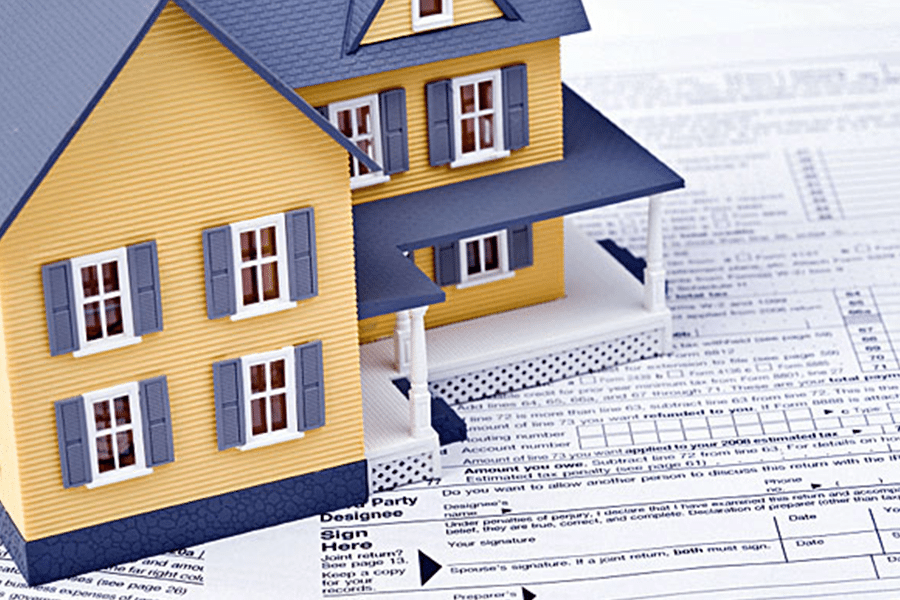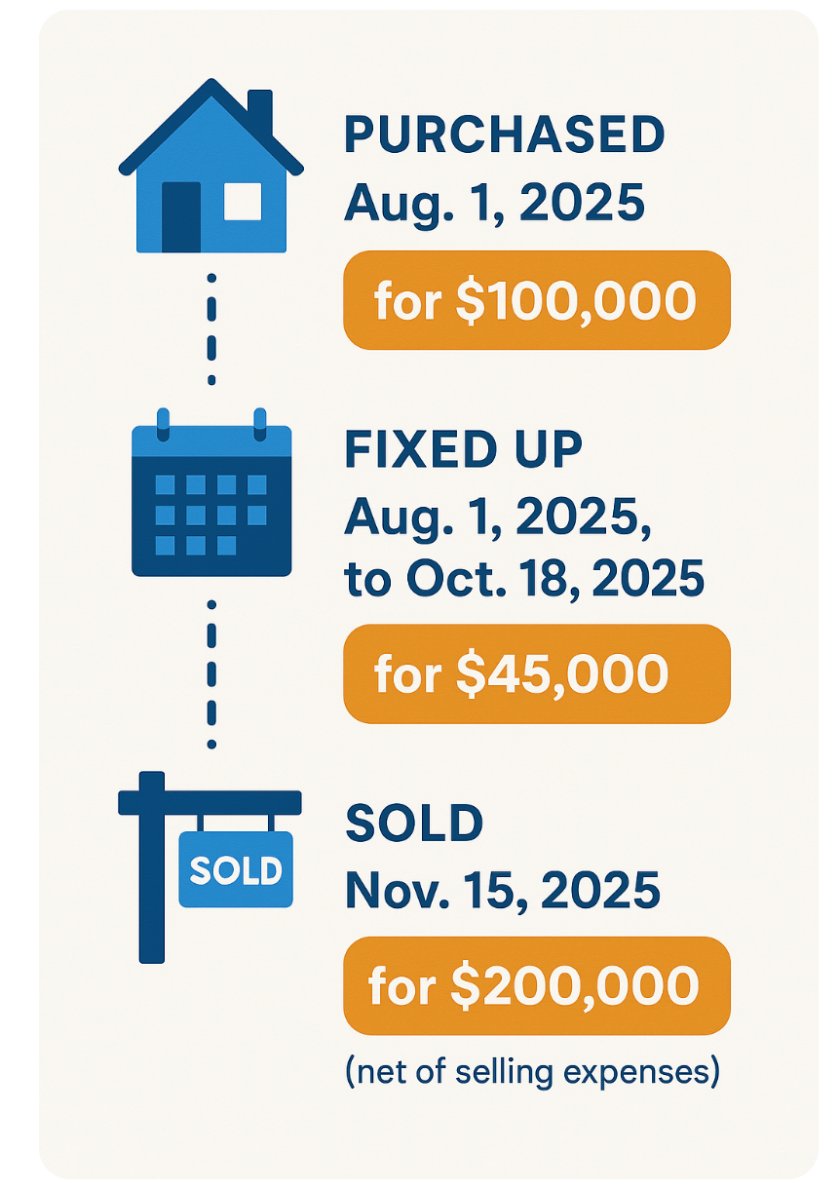Purchasing a rundown house, fixing it up, and then reselling it has become a very popular side gig for many Americans. For most house flippers, the profit from selling the house will be taxed as ordinary income and is subject to self-employment taxes. However, there are a few ways you can lower your house flipping taxes by qualifying for the lesser capital gains tax and avoiding the self-employment tax.
Real estate classified as a long-term capital asset is generally subject to a lower tax rate. If real estate is classified as inventory, it does not qualify as a capital asset. You’ll save more taxes on flipping houses if the houses are classified as something other than inventory.
Generally, a house can be classified as one of three different property types:
- Inventory: Profit from inventory is taxed as ordinary income and is subject to self-employment tax if sold by individuals.
- Passive investments: Gains on the sale of passive investments are taxed as capital gains. Houses are passive investments if they are rented out or held with the hopes that they will increase in value.
- Primary residence: Most gains from the sale of a primary residence are excluded from tax, but generally require you to live in the house for two out of the prior five years.
When is a flipped house inventory?
Most house flips are taxed as ordinary income because the house is considered to be inventory and the flipper is considered to be a dealer in that inventory. Unless the flipper is taxed as a C corporation (C-corp) or S corporation (S-corp), the sale of inventory will also be subject to self-employment tax.
Inventory is defined as property purchased with the intention of reselling it for a profit — it doesn’t matter whether the property purchased for resale is a $5 widget or a $5 million mansion. So, if you plan to purchase a house, fix it up, and resell it, then the house is inventory.
Pat loves watching HGTV and has decided to flip their first house. Here is a history of the purchase, fix-up, and sale:
Let’s assume that Pat has a federal ordinary income tax rate of 24% and that they purchased the house personally rather than through an S-corp or other entity. Pat has a profit on their flipped house of $55,000 (200,000 – 100,000 – 45,000). The profit is subject to both ordinary income tax and self-employment tax.
Ordinary Income Tax | Self-employment Tax | Total Tax | |
|---|---|---|---|
Profit | $55,000 | $55,000 | $55,000 |
Tax rate | 24% | 15.3% | 39.7% |
Tax | $13,200 | $8,415 | $21,615 |
Pat’s federal tax on the house flip would total $21,615. Pat’s state tax impact would depend on their state income tax rate. Let’s look at how the total tax paid would differ if the house were a passive investment or a personal residence.
When is a house a passive investment?
When a house is purchased with the expectation that its value will increase over the long-term, the house is a capital asset for tax purposes—and any gain will be taxed as a capital gain.This would be considered a passive investment.
You may also choose to use a home you own as a rental property. This usage is another type of passive investment. Houses purchased and owned with the intention of renting them out are called 1231 property. When 1231 property is held more than a year and sold at a profit, it’s taxed as capital gain.
Let’s assume the same basic facts as in our example above, except that the house was purchased and fixed up with the intention of holding it as a rental property. The house was held for three years before being sold for $200,000. For ease of analysis, we’ll omit the depreciation expense Pat could’ve claimed on the rental property.
Based on Pat’s 24% ordinary tax rate in the first example, their capital gains tax rate is 15%.
Capital Gains Tax | Self-employment Tax | Total Tax | |
|---|---|---|---|
Profit | $55,000 | N/A | $55,000 |
Tax Rate | 15% | 15.3% | 15% (only the 15% rate applies) |
Tax | $8,250 | N/A | $8,250 |
By holding the house as rental property instead of inventory, Pat saved a whopping $13,365 ($21,615 from the previous example, less $8,250 from the current example) in tax. Most of this tax savings came from the profit not being subject to self-employment tax.
If you’d like to learn more about the kinds of deductions that can be taken for rental property, check out our article on the Top 12 Rental Property Tax Deductions & Benefits.
Strategies for lowering house flipping taxes for one-time flippers
Many learn that house flipping isn’t for everyone after their first attempt — so they’re now holding onto a house that they don’t know what to do with. If they sell it as originally planned, they may owe a mountain of tax.
The next best option is to convert the house from inventory to either a rental or primary residence. Let’s talk about how that can be done.
As we showed above, the profit on the sale of rental property is taxed at the lower capital gains rate and is not subject to self-employment tax. However, you’ll need to rent the house out for a substantial period before selling it to make this work.
So, how long do you have to rent out a house before it is no longer inventory? There is no clear-cut answer, but you need to demonstrate a clear intent to hold onto the property and make a profit through rental. Renting out your flipped house while still actively trying to sell it will not be enough to convert the house from inventory to rental. You can support this conversion by keeping records of your rental income, expenses, leases, etc.
This is the most clear-cut way for a one-time house flipper to avoid tax on the sale of the flipped house. The rules are very simple: move into the house and use it as your primary residence for two years, and you can exclude up to $250,000 of gain ($500,000 for married taxpayers who also live in the house).
Converting the house to your primary residence might work very well for a single person living in an apartment. But, of course, if you’re married with school-aged children, moving might be a very big ordeal. You’ll need to determine if the tax savings are worth it.
The following items can help establish proof of a primary residence. None of these items function as independent verification, but together they can paint a comprehensive picture of facts and circumstances for the IRS.
Here are five actions you can take to help prove a home is your primary residence:
- Update your driver’s license to reflect the home’s address.
- Register to vote using the home’s address.
- File your federal and state tax returns using the home’s address.
- Receive mail and bills (e.g., utilities, insurance) at the home.
- Spend the majority of your time living at the property throughout the year.
If you find yourself unsuccessful on your first attempt at a home flip, converting that property to a rental or primary residence are two ways to minimize what you might otherwise owe to the IRS.
Strategies for lowering taxes on flipping houses for frequent flippers
If you flip houses frequently, the houses are inventory, and the profit is taxed as ordinary income. However, there are still ways for you to reduce your taxes.
This is one of the biggest things you can do to minimize your taxes on flipped houses, specifically self-employment taxes. Owners of a house-flipping enterprise organized as an S-corp pay taxes on the following:
- A fair wage or salary for the work they perform to flip and sell the house. These earnings will be reported on Form W-2, and employment taxes must be paid the same as for any employee. The employment taxes paid by the S-corp and the employee lead to a total of 15.3% (the equivalent of the self-employment tax paid by individuals).
- Any remaining net income in the S-corp in excess of the salary. This must be reported by the owner and is subject to ordinary income tax rates. However, this S-corp income is NOT subject to self-employment tax, which is what generates the tax savings from S-corp conversion.
This is a good tip for any small business. By paying your children a reasonable wage for helping with the house flip (perhaps doing some admin tasks or other age-appropriate duties), you can claim a deduction for your business while your child doesn’t pay income tax on their first $15,000 (for 2025) of wages.
To illustrate this principle, let’s assume Pat has converted their flipping business to an S-corp and still has a marginal tax rate of 24%. Pat decides to pay Pat Jr. $20,000 for administrative help with the house flipping business.
Tax Savings with an S Corp:
$20,000 x .24 = $4,800 tax savings
$20,000 x .153 = ($3,060) reduction in tax savings from FICA tax on your child’s wages
Total tax savings: $1,530
Now let’s compare that $1,530 savings to Pat’s savings if they were set up as a sole proprietor.
Tax Savings with a Sole Proprietorship:
$20,000 x .24 = $4,800
Total tax savings: $4,800
The child’s wage deduction of $20,000 results in a business tax savings of $4,800 irrespective of entity type. However, with an S-corp, some of that savings is eaten up by the additional FICA tax of $3,060.
If you regularly flip houses, you can combine both tips (converting to an S-corp and paying your kids for assistance) for combined tax savings. Just don’t forget that you’ll need to take into account additional FICA tax on wages in excess of $15,000 (for 2025) paid to your children. For more information on keeping employment for your small business in the family, read how paying your child from your business can save taxes.
Generally, selling a flipped house comes with an influx of cash. One way to avoid paying tax on that cash is to offset the income with a deductible retirement contribution.
While there are several types of retirement plans to choose from, an easy-to-administer plan is a Savings Incentive Match Plan for Employees individual retirement account (SIMPLE IRA). For 2025, you can contribute and deduct up to $16,500 to a SIMPLE IRA. Both sole proprietors and S-corps can participate in SIMPLE IRAs.
Note that if you have employees who earn over $5,000 per year, then you’ll need to give them the option of participating in the SIMPLE plan. You’ll need to match the first 3% of the wages they place into the plan if they elect to participate. Head over to the IRS’s SIMPLE IRAs page to learn more.
State tax considerations
At the federal level, the Internal Revenue Service (IRS) typically classifies profits from house flipping as ordinary income, especially if flipping is conducted as a business. This means profits are taxed at your standard income tax rate and may also be subject to self-employment taxes.
If you’re deemed a “dealer” — someone who frequently buys and sells properties — the IRS treats the properties as inventory, excluding them from capital gains tax benefits. Within each state, tax treatment for house flipping profits varies. Here are some highlights of state taxation on house flipping:
- States with no income tax: Alaska, Florida, Nevada, New Hampshire, South Dakota, Tennessee, Texas, and Washington do not have a traditional income tax, so profits from house flipping aren’t subject to state income tax. New Hampshire and Tennessee tax only dividend and interest income, excluding earned income like house flipping profits.
- States taxing capital gains as ordinary income: Many states tax capital gains at the same rates as ordinary income. For instance, if you flip a house in California, the profit is taxed as regular income according to the state’s tax brackets.
- Special capital gains taxes: Some states also have specific rules regarding capital gains taxes. For example, the state of Washington imposes a 7% capital gains tax on profits exceeding $270,000 (for 2024) from the sale of certain assets. However, real estate sales are exempt from this tax. It’s important to confirm if your state’s capital gains tax includes real estate transactions.
Before proceeding with real estate transactions, please consult the website for the Department of Revenue in your state for any recent updates or changes.
Tax breaks that don’t apply to flipped houses
House flippers often do not qualify for certain tax breaks that apply to long-term real estate investors or homeowners. Here are some tax benefits that may not apply to house flippers:
- Section 121 Exclusion (Primary Residence Exclusion) – Flippers usually cannot exclude $250,000 ($500,000 for married couples) in capital gains from taxable income, since this exclusion requires the property to be their primary residence for at least two of the past five years.
- Gain deferral through installment sales or 1031 exchanges – This tax-deferral strategy applies to investment properties held for productive use in a trade or business. Flippers typically hold properties for short-term resale rather than long-term investment, making them ineligible.
- Depreciation Deductions – For house flippers, houses are considered inventory. Inventory cannot be depreciated.
- Home Improvement Deductions – Home improvement expenses are not current-year write-offs. These expenses are part of the cost of goods sold (COGS) and reduce the tax on your profit when the property is sold.
For more information on IRS regulations on selling your home, see IRS Publication 523.
Impact of TCJA and SALT Cap Expiry
The Tax Cuts and Jobs Act (TCJA) of 2017 introduced several changes affecting real estate transactions, including house flipping. Unless Congress extends the TCJA, these changes are set to expire on December 31, 2025.
- Tax Treatment of Income: Profits from flipping houses are typically considered ordinary income, subject to standard income tax rates and self-employment taxes. The TCJA reduced individual tax rates, with the top rate decreasing from 39.6% to 37%, potentially lowering the tax burden for house flippers.
- Qualified Business Income Deduction (QBI): The TCJA introduced a 20% deduction for qualified business income from pass-through entities like sole proprietorships, partnerships, and S corporations. House flipping businesses have historically been eligible for the deduction, but if this provision is not renewed, house flippers could see an increase in taxable income.
- Limitation on State and Local Tax (SALT) Deductions: The TCJA capped the deduction for state and local taxes, including property taxes, at $10,000. This limitation increases the after-tax cost of owning property in high-tax states, potentially affecting the profitability of house flipping in those areas. If this provision is permitted to expire, it may be easier to flip houses because the cost of owning property would decrease in high property tax states like New Jersey.
If the TCJA provisions are extended, house flippers would continue to benefit from deductions like the QBI deduction. However, in high property tax states, the continuation of SALT limitations would keep flipped homes less appealing. However, since Congress may choose to extend some provisions while allowing others to expire, the full impact of the TCJA extension or expiry remains to be seen.
Frequently asked questions (FAQs)
Yes — if you purchase real estate intending to resell it in the short term, then you are a real estate dealer and any profit from the flip is ordinary income.
The way you pay yourself depends on how your house-flipping business is organized. If you purchased the house as an individual, you simply keep whatever money is left over after the sale.
Section 1031 allows you to exchange one piece of real property for another piece of real property without recognizing a gain. However, flipped houses are considered inventory and are specifically excluded from section 1031 treatment.
You may avoid paying tax on flipping a house by moving into the house and using it as your primary residence for at least two years. You can then exclude up to $250,000 ($500,000 for joint taxpayers) of the gain on the primary residence when you sell it.
For a sole proprietor or single member LLC, flipping a house is typically reported as ordinary income on Schedule C of your tax return if it’s part of a business activity.
You generally can’t avoid capital gains tax on house flipping, as profits are usually taxed as ordinary income if the activity is considered a business. However, using strategies like holding the property for over a year, living in the home as a primary residence, or structuring the flip through certain business entities may help reduce the tax burden.
Bottom Line
Generally, the profit from house flipping is taxed as ordinary income and is subject to self-employment tax if the house flip is done by an individual. Frequent house flippers can reduce their self-employment tax liability by purchasing the houses through an LLC or S-corp. One-time flippers looking for a way to dispose of their flipped home without paying a lot of tax should consider converting the flipped home to a long-term rental property or making the flipped home their primary residence for at least two years.



